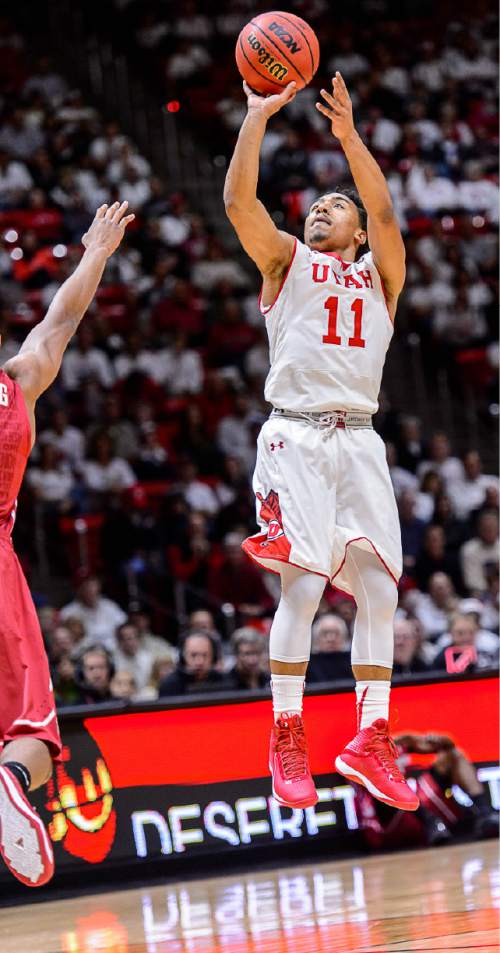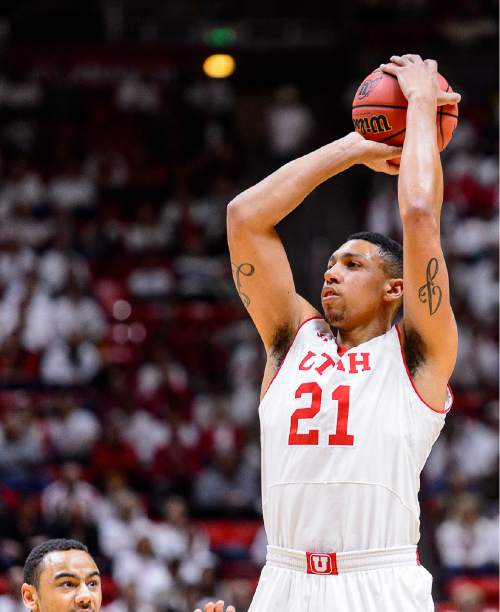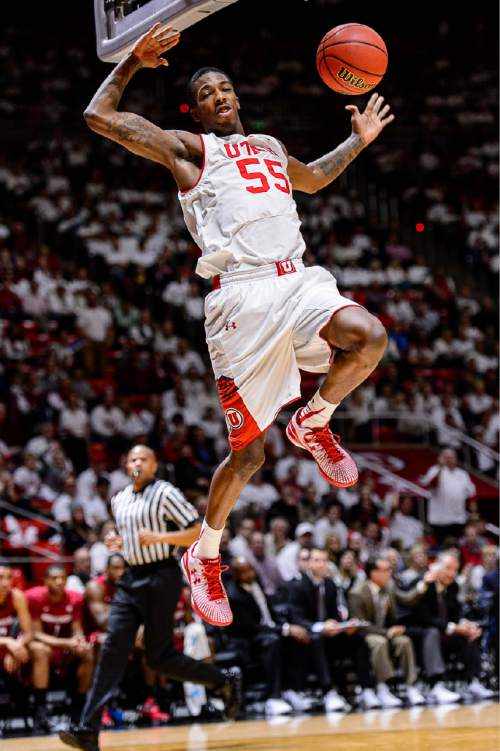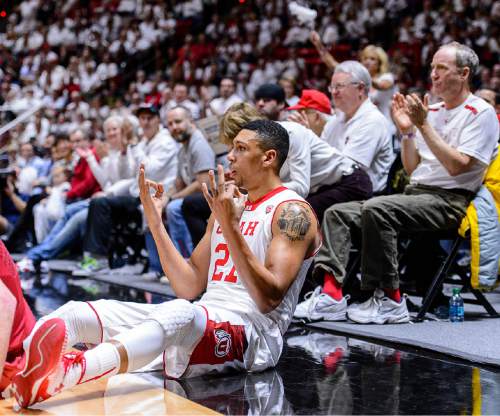This is an archived article that was published on sltrib.com in 2015, and information in the article may be outdated. It is provided only for personal research purposes and may not be reprinted.
It shouldn't be a surprise that the pivotal point of Utah's win over Washington State started with a 3-pointer.
Brandon Taylor streaked by the baseline, whipping a pass to an open Jordan Loveridge, who stared down the outstretched hand of Brett Boese and sank his shot from the corner. And one.
It spurred a 22-4 finish to the half, in which Utah turned the ball over not once in the final seven minutes, and Washington State made only one shot. By halftime, with a 46-27 lead, Utah's starting backcourt of Delon Wright and Taylor had accounted for a combined 18 points and eight assists, while Wazzu's had about half that production.
The No. 12-ranked Runnin' Utes (15-3, 5-1) continue to show that even with more size than they have had in several years, they are a guard-led team.
"Delon and Brandon, defensively, really set the tone for us in the backcourt and didn't make things easy," coach Larry Krystkowiak said. "We're trying to pick up some people and deflections and were able to get some of those steals. With the exception of a few plays, I thought we made what Washington wanted to do difficult."
Utah's guards and wings always make things difficult.
With Loveridge healthy, Utah's weapons are difficult to account for all at once. There's Wright, the potential All-American who can drive and dish as effectively as any point guard in college basketball. Taylor often guards the opponent's leading scorer, and he's picking up a knack for hitting big shots. Loveridge's versatility — he played some stretch four against the Cougars — makes him valuable, as does his 3-point shooting improvement up to 48 percent this year.
A former big man himself, Krystkowiak has pushed the Utes in the direction of inside-out offense, having bigs score inside to help the guards on the perimeter. That seemed to be coming together this year with the additions of Jakob Poeltl, Brekkott Chapman and Chris Reyes.
But as conference play gets rolling, the truth has been revealed: The Utes still rely on their wings for a spark, particularly on offense. Utah's top four scorers in Pac-12 play are Wright, Taylor, Loveridge and Dakarai Tucker. Together, they account for 60 percent of Utah's points.
The surge comes at a time when the bigs are encountering some struggles: Utah is only out-rebounding opponents by less than a board on average, as opposed to its plus-6.3 mark for the whole year.
Poeltl, Chapman and Reyes have all seen their scoring averages dip into conference play, and the Utes have been blocked 26 times, one more time than they've blocked their Pac-12 foes after out-blocking opponents 3 to 2 throughout the year.
Losing at Arizona exposed several flaws for the Utes — wings and bigs alike — but in the bounce-back win, it seems the guards heard the message most clearly.
"Arizona really made me feel some type of way, and I think really woke us all up," Taylor said. "We've been kind of riding this high horse, and it's a game that brings you back to reality and keeps you on a grind."
Looking around the country, some of the nation's best teams have the kind of frontcourt players who lead: Duke's Jahlil Okafor and Wisconsin's Frank Kaminsky spring to mind, but so do Gonzaga's Kyle Wiltjer or Kentucky's Willie Cauley-Stein. In the Pac-12, players like Kevon Looney and Robert Upshaw will continue to challenge Utah's posts. It's hard to see the Utes going far in March without being able to challenge some of those stars up front.
But at the same time, there's a sense of safety in a backcourt that has proven it can pound many teams in the league — taking control when they must.
Twitter: @kylegoon —
Utah's wing players taking control
P During conference play, the Utes have seen their wing players take a greater role, particularly on offense:
• Utah's top four scorers in league play are Delon Wright (13.8), Brandon Taylor (12.3), Jordan Loveridge (10.8) and Dakarai Tucker (7.0)
• The Utes are shooting 43.9 percent from 3-point range in Pac-12 play (No. 2 in the league)
• Utah has a 1.673 assist-to-turnover ratio in league play, leading the Pac-12
• Utes allowing opponents only 30.9 percent 3-point shooting in league play (No. 2)









